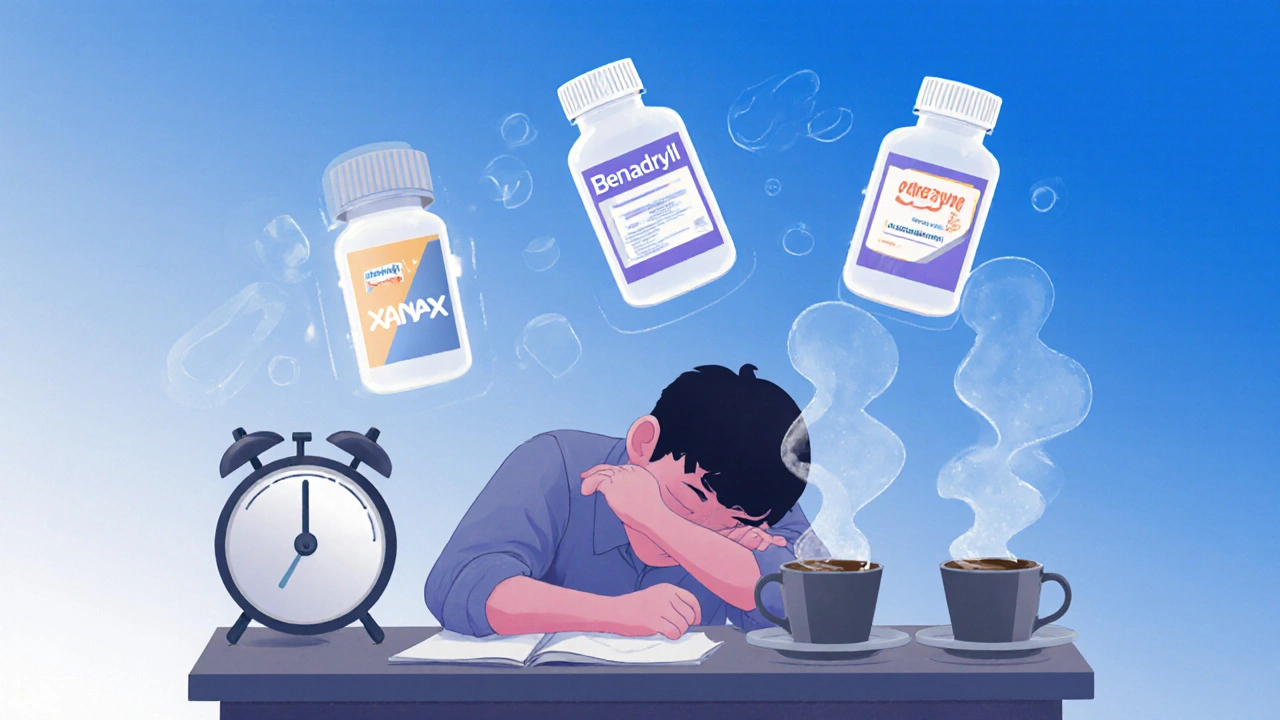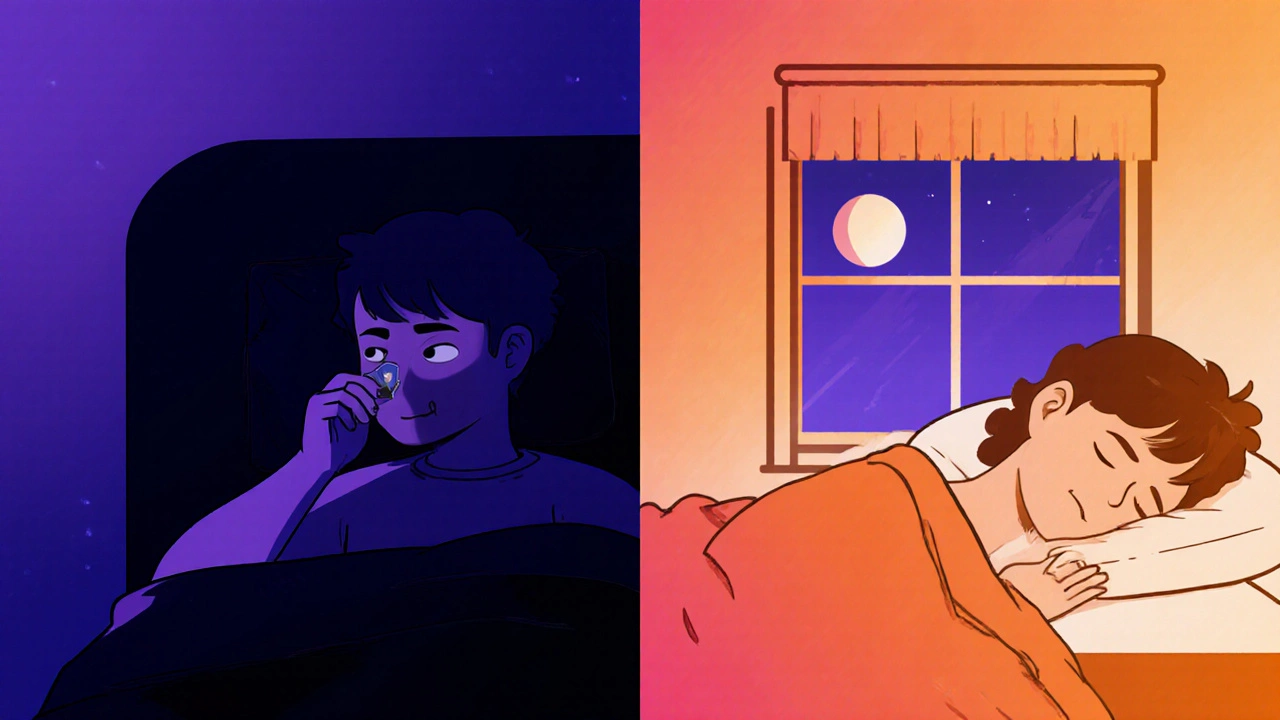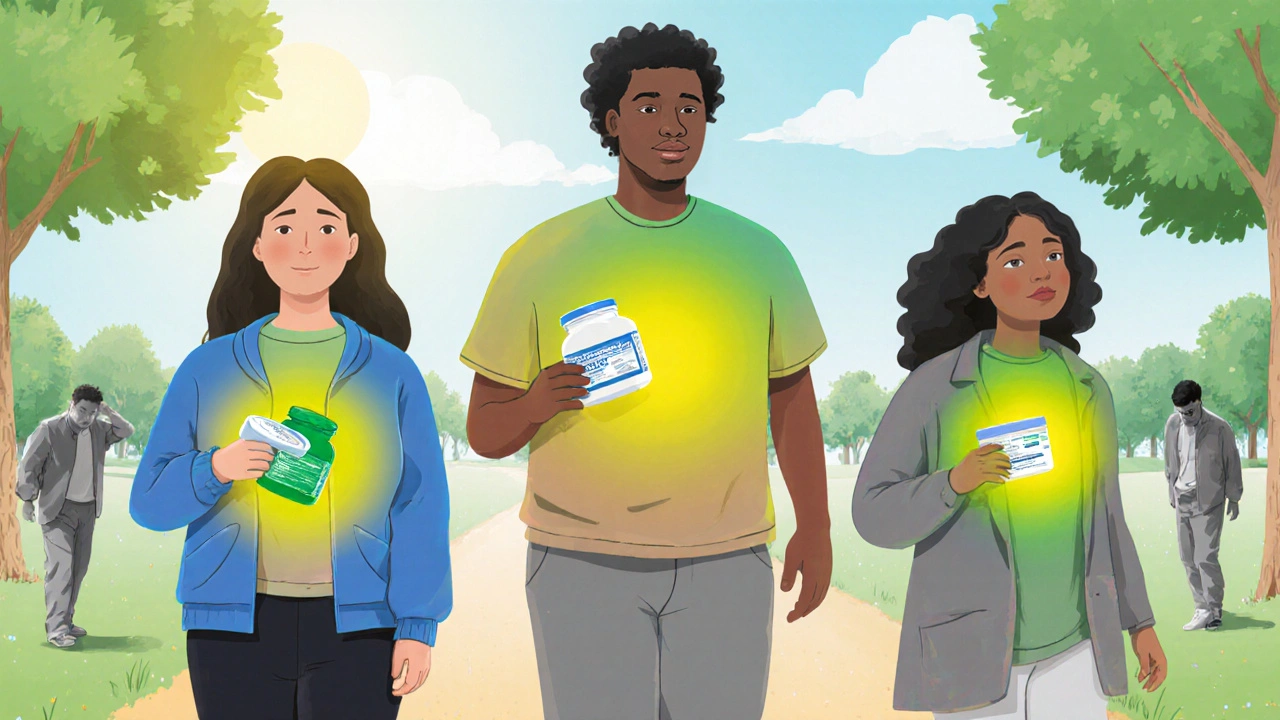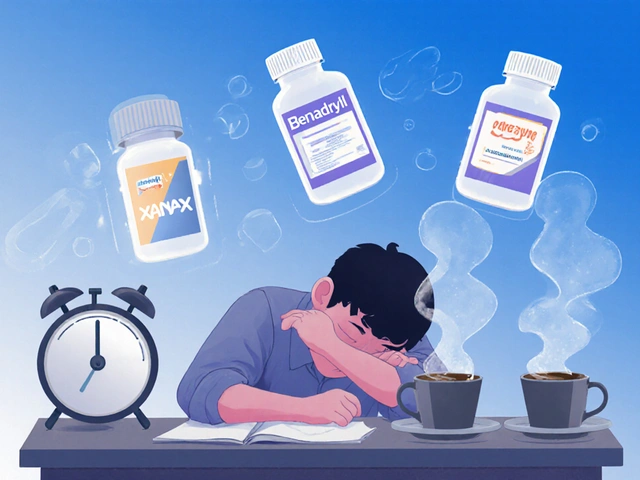Medication-Induced Drowsiness: What Causes It and How to Manage It

Medication Drowsiness Risk Calculator
Assess Your Medication Drowsiness Risk
Enter the medications you're currently taking to see your risk level and get personalized recommendations.
Your Medication Drowsiness Risk Assessment
Feeling constantly tired after taking your meds? You’re not alone. About 15-20% of adults on prescription or over-the-counter drugs report excessive daytime sleepiness as a side effect. It’s not just being a little sluggish-it’s falling asleep at your desk, nearly nodding off while driving, or needing 10 extra hours of sleep just to feel normal. This isn’t laziness. It’s medication-induced drowsiness, a real and often overlooked medical issue.
What’s Really Causing Your Sleepiness?
It’s not just one thing. Many common medications slow down your central nervous system (CNS), and that’s what makes you feel like you’re moving through molasses. The most frequent culprits fall into clear categories:- Antihistamines: Even non-prescription ones like diphenhydramine (Benadryl) or hydroxyzine (Vistaril) hit over half of users with intense sleepiness. These are often used for allergies, motion sickness, or even insomnia-but they don’t just help you sleep. They keep you sleepy.
- Tricyclic antidepressants: Drugs like amitriptyline and doxepin are effective for depression and chronic pain, but 30-40% of people on them report constant fatigue. It’s not just in the first week-it can stick around for months.
- Benzodiazepines: Xanax, Valium, Klonopin-they work fast to calm anxiety, but they also calm your brain too much. Drowsiness can last hours or even days, especially with long-acting versions.
- Beta-blockers: Used for high blood pressure and heart conditions, drugs like metoprolol and propranolol can make you feel drained. About 10-15% of users say they can’t shake the tiredness, even after months.
- Opioids and muscle relaxants: Oxycodone, hydrocodone, cyclobenzaprine-they’re powerful pain relievers, but they also suppress your alertness. And when combined with benzodiazepines? The CDC reports over 16,700 overdose deaths in 2021 from this dangerous mix.
- Other offenders: Gabapentin, pregabalin, Parkinson’s meds like carbidopa-levodopa, and even some antibiotics can throw off your energy levels.
What’s worse? Many people don’t connect their sleepiness to their meds. A 2023 patient study found people wait an average of 4.2 months before realizing their pills are the cause. By then, they’ve missed work, skipped activities, or even had near-accidents.
Why This Isn’t Just ‘Normal’
You might think, “Everyone feels tired sometimes.” But medication-induced drowsiness is different. It’s not temporary fatigue from a bad night. It’s a direct chemical effect. Your brain’s wakefulness centers are being suppressed. That’s why coffee doesn’t always help-and sometimes makes things worse.Take caffeine, for example. Some people swear by it to fight drowsiness. But Harvard Health warns: drinking coffee after noon can wreck your nighttime sleep, which means you’re even more tired the next day. You’re not fixing the problem-you’re just masking it with a cycle of dependence.
And here’s the scary part: stopping these meds cold turkey can be dangerous. Benzodiazepines, for instance, carry a 30-45% risk of withdrawal symptoms-including seizures-if you quit suddenly. Antidepressants can trigger serotonin syndrome. That’s why you never stop on your own, no matter how tired you feel.
Real People, Real Stories
On Reddit, users share what works-and what doesn’t. One person on r/medicationadverseeffects said taking just 10mg of amitriptyline made them sleep 14 hours a day. Their doctor switched them to desvenlafaxine, and suddenly they had energy again. Another user swapped propranolol for nebivolol and stopped having afternoon crashes.On Drugs.com, hydroxyzine has a 2.8/5 rating-with 32% of negative reviews saying, “I can’t drive after taking it.” Meanwhile, people who switched to second-generation antihistamines like loratadine (Claritin) or cetirizine (Zyrtec) report almost no drowsiness. These newer options now make up 78% of the allergy med market because they’re designed to avoid crossing into the brain.
These aren’t outliers. They’re patterns. The data backs them up: 68% of people on first-gen antihistamines report drowsiness that impacts daily life. That’s nearly 7 out of 10.

How to Fix It-Without Quitting Your Meds
You don’t have to live with constant fatigue. Here’s what actually works, based on clinical data and patient outcomes:- Take your meds at night. This is the single most effective trick. If your pill causes drowsiness, taking it before bed shifts the side effect to when you’re already sleeping. Studies show this reduces daytime sleepiness by 50-70% in 82% of people who try it.
- Ask about alternatives. Is there a non-sedating version? For allergies, switch from Benadryl to Claritin. For depression, try an SSRI instead of amitriptyline. For blood pressure, nebivolol often replaces propranolol with less fatigue.
- Check for drug interactions. Alcohol, sleeping pills, or even some herbal supplements can multiply drowsiness. VisualDx warns that combining opioids and benzodiazepines can be fatal. Even a single glass of wine can turn a mild side effect into a dangerous one.
- Move more during the day. Light exercise-like a 20-30 minute walk-boosts alertness naturally. Patients who added daily movement saw a 30-40% improvement in fatigue scores, even without changing meds.
- Stay hydrated. Dehydration makes drowsiness worse. If you’re taking diuretics or anticholinergics, your body may be losing fluids without you realizing it. Drink water consistently, not just when you’re thirsty.
- Protect your sleep. Aim for 7-8 hours of quality sleep every night. Poor sleep hygiene makes medication side effects feel worse. No screens an hour before bed. Keep a consistent schedule. Your brain needs stability.
When to Call Your Doctor
Don’t wait until you’re falling asleep behind the wheel. Contact your provider if:- Your drowsiness is getting worse, not better.
- You’re missing work, school, or family events because you’re too tired.
- You’ve tried timing your dose at night and still feel exhausted.
- You’re mixing medications and feel unusually sluggish.
- You’re an older adult-drowsiness increases fall risk by 20-30% in seniors, according to JAMA Internal Medicine.
Your doctor might adjust your dose, switch your medication, or add a non-sedating alternative. In some cases, they might even prescribe solriamfetol (Sunosi), a newer drug approved for excessive sleepiness. While it’s mainly for narcolepsy, doctors are increasingly using it off-label for medication-induced fatigue under careful supervision.

The Bigger Picture
This isn’t just about individual discomfort. Medication-induced drowsiness costs the U.S. economy over $411 billion a year in lost productivity. The FDA received over 127,000 reports of drowsiness-related side effects in 2022-up 22% since 2018. And it’s getting worse as more people take multiple prescriptions.Pharmaceutical companies are responding by developing non-sedating versions of old drugs. But the real solution isn’t just better pills-it’s better awareness. Patients need to know: drowsiness isn’t normal. It’s a signal. And it’s manageable.
What’s Next?
The future is personal. Companies like GeneSight are using genetic testing to predict who’s likely to have bad side effects from certain drugs. Early results show a 35% drop in adverse reactions when doctors use this data to choose meds.But for now, the simplest tools are still the most powerful: tracking your symptoms, talking to your doctor, and adjusting timing. You don’t need a high-tech app to feel better. You just need to know what’s going on-and the courage to ask for help.
Can I just stop taking my medication if it makes me sleepy?
No. Stopping medications like benzodiazepines, antidepressants, or blood pressure drugs suddenly can cause dangerous withdrawal symptoms, seizures, or a rebound in your original condition. Always talk to your doctor first. They can help you taper safely or switch to a better option.
Will I get used to the drowsiness over time?
Sometimes, yes. For about 60-70% of people, drowsiness lessens after 2-4 weeks as the body adjusts. But for some medications-like tricyclic antidepressants or certain antihistamines-the tiredness doesn’t fade. If you’re still exhausted after a month, it’s not tolerance-it’s a sign the drug isn’t right for you.
Does caffeine help with medication-induced drowsiness?
It might help temporarily, but it’s not a long-term fix. Caffeine can mask the drowsiness, but if you drink it after noon, it can disrupt your sleep at night. That makes you even more tired the next day. It’s a cycle that often makes things worse.
Are there any over-the-counter meds that don’t cause drowsiness?
Yes. Second-generation antihistamines like loratadine (Claritin), cetirizine (Zyrtec), and fexofenadine (Allegra) are designed to avoid crossing into the brain, so they rarely cause sleepiness. For pain, try acetaminophen instead of opioids. Always check the label for “non-drowsy” or “non-sedating” on the box.
Why do older adults get more affected by medication drowsiness?
As we age, our bodies process drugs slower, and our brains become more sensitive to CNS depressants. About 34% of medications commonly prescribed to seniors cause drowsiness. This increases fall risk by 20-30%, which is why the American Geriatrics Society lists these drugs as potentially inappropriate for older adults unless absolutely necessary.
Can lifestyle changes really make a difference?
Absolutely. Simple changes-taking meds at night, walking daily, staying hydrated, and avoiding alcohol-can cut daytime sleepiness in half for many people. You don’t need to quit your meds. You just need to adjust how you use them.


henry mariono
Been on amitriptyline for six months. Thought I was just getting old. Turns out it was the med. Switched to sertraline last month and I’m actually awake during meetings now. No magic, just a better fit.
Also, taking it at night changed everything. I used to crash at 2 PM. Now I’m fine until dinner.
Don’t suffer in silence. Talk to your doctor. They’ve heard it all before.
Sridhar Suvarna
India here. Many people take antihistamines like cetirizine for colds and allergies without knowing they can still cause drowsiness. Even non sedating ones affect some of us more than others. I once drove 80 km after taking Zyrtec and nearly fell asleep at a red light. Never again.
Best advice? Check the leaflet. If it says 'may cause drowsiness'-assume it will. And never mix with chai or alcohol. Both are deadly together.
Joseph Peel
The data presented here is statistically sound and clinically relevant. The distinction between first- and second-generation antihistamines is particularly well-documented in peer-reviewed literature, with clear pharmacokinetic differences explaining CNS penetration. The 78% market shift toward non-sedating agents reflects evidence-based prescribing trends that began in the late 1990s.
Additionally, the recommendation to time dosing at night aligns with chronopharmacology principles, which optimize therapeutic efficacy while minimizing adverse effects. This is not anecdotal-it is pharmacologically deliberate.
Further, the economic burden cited ($411 billion) is corroborated by CDC and NIH longitudinal studies on workplace productivity loss. This issue demands systemic attention, not just individual adjustments.
Kelsey Robertson
Ugh. So we’re supposed to believe that every single person who’s ever felt tired on meds is just ‘not trying hard enough’? You know what else causes drowsiness? Being broke. Being overworked. Being depressed. Being a woman in America who’s been told to ‘just take a pill’ for everything from PMS to existential dread.
And now you want me to blame my meds? Maybe I just need to stop taking the pills that make me numb so I can finally feel how miserable my life is.
Also-solriamfetol? That’s a $1,200/month drug. You think I can afford that? Or do I just keep nodding off at my Walmart job while you doctors sip your lattes and call it ‘off-label innovation’?
Joseph Townsend
MY GOD. I WAS ON 50MG OF AMITRIPTYLINE FOR SIX MONTHS AND I SLEPT LIKE A DEAD BEAR IN HIBERNATION. I WOKE UP ONCE AND THOUGHT IT WAS SATURDAY. IT WAS WEDNESDAY. I HAD TO CALL MY BOSS AND SAY ‘I THINK MY BRAIN IS ON VACATION.’
Then I switched to fluoxetine. No more 14-hour naps. No more crying in the shower because I couldn’t get up. I went from zombie to human in 11 days.
Also-DON’T MIX WITH ALCOHOL. I DID. I WENT FROM ‘TIER 1 ZOMBIE’ TO ‘TIER 5 HALLUCINATING GHOST.’ I SAW A CLOWN IN MY CLOSET. HE WAS HOLDING MY PILLS. HE SAID ‘YOU’RE WELCOME.’
JUST SAY NO TO BAD MEDS AND BAD CHOICES.
Bill Machi
Another woke medical article pushing pharmaceutical propaganda. You think people are tired because of meds? Nah. They’re tired because they’re lazy. No one worked hard enough in this country anymore. You take a pill, you feel sleepy, you blame the doctor? Wake up. Go to the gym. Eat clean. Stop whining.
And don’t get me started on ‘non-sedating’ antihistamines. That’s just corporate marketing. All drugs are poison. The government just makes you think some are ‘safer.’
Also, if you’re taking more than three pills a day, you’re probably part of the problem. America’s addicted to chemicals. We need less medicine, not more.
Elia DOnald Maluleke
From the dusty hills of Pretoria, I say: this is not just medicine-it is the silent collapse of modern consciousness.
We have become a species that outsources our vitality to pills. We swallow chemicals to fix the symptoms of a life we no longer live. The drowsiness? It is not a side effect-it is the soul’s protest.
My grandfather, a farmhand in the 1950s, took no pills. He worked 14 hours. He slept 6. He woke up. He did not ask why.
Now, we have 17 medications for 17 symptoms… and still we sleep.
Perhaps the answer is not a new drug… but a return to rhythm. To sunlight. To silence. To the earth.
But I know-I am a fool. The machines will keep spinning. The pills will keep coming.
And we… we will keep dreaming in slow motion.
satya pradeep
Bro I took cetirizine for allergies and felt like a zombie for 3 days. Thought it was my diet. Then I read the fine print-'may cause drowsiness'-DUH. Switched to loratadine and now I’m back to normal. Also, never take it with tea. I did once and nearly fell off my bike.
PS: If your doc says ‘it’ll wear off’ and you’re still dead after 2 weeks-go back. They’ll listen. I promise.
PPS: Hydration is key. I drink 3L water now. No more 3PM crashes. Just sayin’.